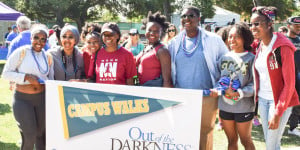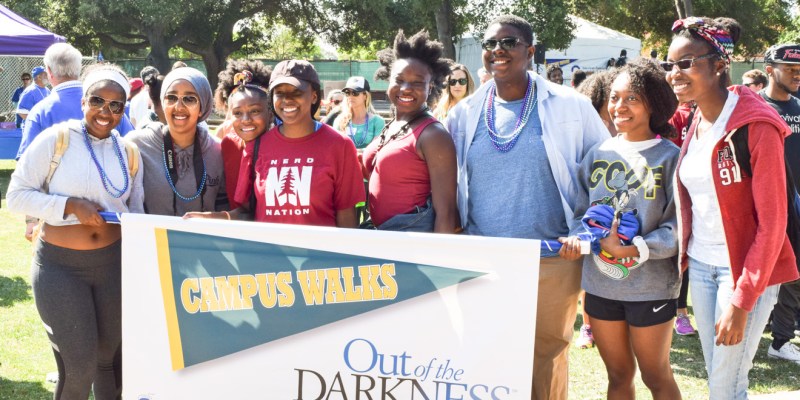
Early Sunday morning, over a hundred students from a variety of groups, majors, and backgrounds took a walk together in Stanford’s first Out of the Darkness Walk to raise awareness about suicide prevention.
Held by the American Foundation for Suicide Prevention (AFSP), Out of the Darkness Walks seek to unite those who have grappled with suicidal thoughts or have attempted suicide, as well as their loved ones, and to raise public awareness through community walks. College campuses can also sponsor these walks, and a few University of California campuses, including Berkeley and Los Angeles, already do so.
This is the first year the walk has been held at Stanford. The event was widely seen as a success, with just under $8,000 raised thus far and about 140 people showing up for a 5k walk around campus starting at the Cobb Track & Angell Field.
The event was spearheaded by Shavana Talbert ’16, who inspired her sorority, Delta Sigma Theta, to sponsor the event.
“Mental health has always been crucial for me, especially at Stanford,” she said. “I feel like we don’t talk about it enough, or maybe we talk about it, but there’s never actually any action, so I really wanted to create an event that would bring people out, create a supportive, healing space, a space to get us all aware and educated about what’s going on in our communities.”
Talbert first began talking with the AFSP last July, wanting to organize an Out of the Darkness Walk at Stanford. Her commitment to the cause goes back even further to her freshman year, when a close friend attempted suicide.
Talbert’s road to getting the walk approved involved a lot of work; she said that though the University was supportive of the walk, there were “a lot of hoops to jump through,” and that many offices that were necessary to go through for approval were understaffed. In fact, the walk was only approved a few weeks prior to the actual event.
Especially with respect to the recent death of Jalen Paukan ’15, mental health has been an issue of particular concern for many students this year, some of whom feel that Stanford is not appropriately addressing mental health needs on its campus. In particular, Counseling and Psychological Services (CAPS) has been criticized for not having enough counselors and for the difficulty in scheduling a prompt appointment.
Showing support
In addition to Delta Sigma Theta, there were many student groups who helped support the Out of the Darkness Walk. Delta Sigma Theta was joined by their fellow sorority Kappa Alpha Theta, but there were also several black student groups in attendance—the Black Student Union, the Black Community Services Center, Black Men’s Forum, and the Stanford NAACP.
The Stanford NAACP, which co-sponsored the event, worked with Delta Sigma Theta to put on the event, including helping on fundraising.
“Suicide and mental health…a lot of times, I think it’s pushed as a political campaign, and a catchprase or buzzword, but I think it’s important to actually press for awareness, press for the ability to talk and have those conversations with those close to you—to check in on people to make sure people are doing alright,” said Trevor Caldwell ’17, financial officer of the Stanford NAACP.
With respect to the number of black student groups at the event, Caldwell again noted the efforts of Delta Sigma Theta, a predominantly black sorority.
“Once it was brought to our attention, the black community as a whole recognizes the importance of mental health and suicide prevention as it pertains to black people,” he added. “It was a unanimous acknowledgement that this is something that’s important to us.”
Speaking out
Before the walk around campus began, there were a few speakers who addressed the crowd to talk openly about suicide and how it had touched their lives. Talbert was among them, as was Erika Kendrick ’96; there were also speakers from the AFSP.
One speech came from Lauren Murphy ’18, who joined AFSP after her father committed suicide when she was 15 and currently works in the Stanford Suicide Prevention Lab in the Department of Psychiatry & Behavioral Sciences. Murphy was on her way to organizing an Out of the Darkness Walk at Stanford when she found out that Talbert was doing the same and offered her support.
Murphy was very pleased with the student turnout and hopeful that the Out of the Darkness Walk would continue to impact student lives at Stanford.
“I think it’s so important to start a conversation about these issues, by getting as many people involved as possible,” she said.
The Northern California Area Director of the AFSP, Ryan Ayers, was proud of the speakers—especially those who, like Kendrick, spoke of their own battles with suicidal thoughts.
“A large part of the conversation about suicide prevention, for years, has been spurred by people like myself who have lost a loved one to suicide,” Ayers said. “More recently, within the last few years, more and more people come out publicly about their own struggles and share their experiences.”
Like Murphy, Ayers was thrilled at the number of people who came to the walk and was eager at the prospect that the AFSP would return to Stanford for the next walk.
“These events give people an easy way to engage with the topic, feel the sense of community, and understand that they’re not alone, whether they’re going through it themselves or if they’ve lost someone,” Ayers said. “We’re really looking forward to this continuing and growing.”
Stanford’s Out of the Darkness Campus Walk has currently raised about $8,000 towards their goal of $15,000.
Contact Jacob Nierenberg at jhn2017 ‘at’ stanford.edu.
